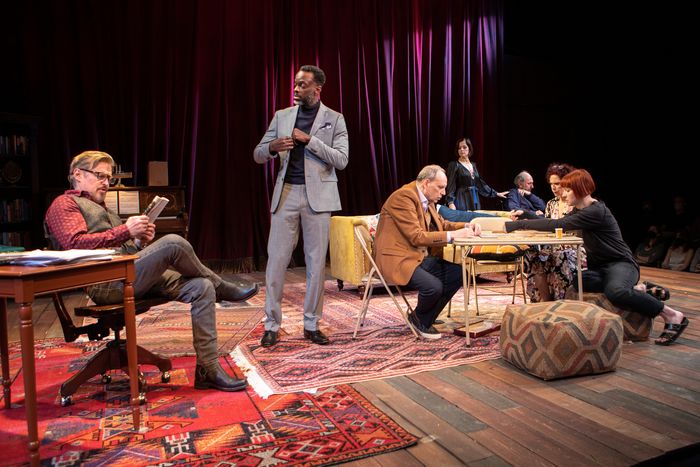
If you are able to recognize a Rachel Comey dress, specifically one from the designer’s collaboration with The New York Review of Books, then The Seagull/Woodstock, NY is a play produced with you in mind. The production transplants Chekhov to the Hudson Valley, recasting the action among a group of very chic, bitter, insular New York intelligentsiacs. Foremost among them is Irene, a successful actress — though only theater-famous, not famous-famous, as a character points out — played by Parker Posey, who strolls around in three different Comey dresses over the course of the production (Qween Jean did the costumes), including one from that NYRB collection. If you recognize the outfits, you get that the joke is on her for embracing expensive, superficial sophistication — though the joke is also on you for getting the reference in the first place.
Thomas Bradshaw’s play is very much for and about people who get the references: not just to that particular dress but to what’s trendy in the theater — Irene gets raves for a gender-flipped production of True West — and what otherwise tends to delight wealthy liberal-minded people who summer upstate (like getting to drive a neighbor’s electric Buick). It helps to have at least a SparkNotes-level familiarity with Chekhov, so that you might recognize that Irene’s an update of the actress Irina Arkadina or that her partner, William (Ato Essandoh), a Black novelist who gets published in The Atlantic and thinks of himself as beyond race because he took a DNA test that revealed he was partially European, is a riff on the self-regarding writer Boris Trigorin. Bradshaw hews close to Chekhov’s plot, down to kicking things off with a performance staged by Irene’s son Kevin (Nat Wolff). Like Chekhov’s Konstantin, he hates the current theater and wants new forms. In this case, that means getting Aleyse Shannon’s Nina (congrats to her on not having a changed name) to perform a monologue about saying the N-word and masturbating behind a curtain onstage.
As a writer, Bradshaw is a bit of a Kevin/Konstantin type himself: He likes to prod at your airier sensibilities, as he’s done when writing about porn. Everyone in Woodstock has something impolite to say about the world — whether in reference to sex, race, cancel culture, or what-have-you. The jokes tend to be on point, but they get tiresome quickly — Have you heard that wealthy New Yorkers are oblivious and prudish? — and drain away our emotional investment. Once you see these characters as satirical fodder, it’s harder to work back to feeling for them as the plot turns toward the melodramatic. Posey has honed the ability to play outlandish but sympathetic women throughout her career (especially in Christopher Guest mockumentaries) and best succeeds in keeping Irene both ridiculous and pitiable. To do that, you notice, she always seems to be in action onstage: preening, fidgeting, posturing, avoiding letting Irene stay still. Scott Elliott, directing, doesn’t get the rest of the cast whirring at her level. There are awkward gaps between bits of dialogue, and the scene transitions lose momentum, sapping the comedy.
The play runs long, but it paradoxically starts to feel rushed, especially in the second act as Bradshaw shuffles the Woodstock folks around in order to mimic the actions of Chekhov’s plot. In some cases, his updates open up interesting avenues: Nina, who has a Black mother and white father, has a rapport with William about how they see their race in relation to their work, and it expands and complicates the original dynamic of her attraction to his fame — Essandoh, exuding the sliminess of someone who would just be so annoying on Twitter, is delightful in this vein. In others, the character feels lost in translation. Hari Nef’s Sasha, a remaking of the original depressive Masha, may wear an of-the-moment black Céline cap, but the way she talks about her doomed love for Kevin cannot help reading as pure 19th-century Russian.
What arises out of all of this is an unresolved tension between sending up the theater and revering it. Woodstock never strays too far from The Seagull, in plot or tone, poking at theatrical conventions, but never overthrowing them, on the way to dutifully reenacting the beats of tragedy. For all of Bradshaw’s provocations in dialogue, I wondered if the plot could change a bit with the new era too. The play comes in throwing elbows, ready to épater la bourgeoisie, but ends up feeling rather respectful of and beholden to the classics.
The Seagull/Woodstock, NY is at the New Group through April 9.


